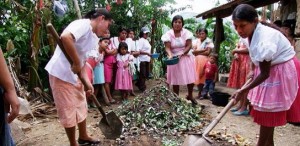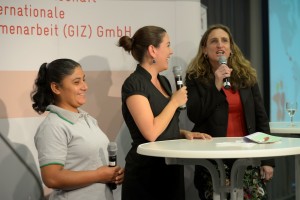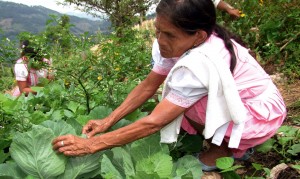Protection of tropical forests and watershed management
CONTEXT AND INITIATIVE
The Trifinio Region is the border area shared by El Salvador, Guatemala and Honduras, as defined in the Trifinio Treaty and Plan. Here gender-based discrimination and women’s
marginalisation are widespread phenomena. This is particularly true for Mayan women in rural communities, such as the Quequesque in Guatemala and the Barrancón in Honduras.
In these communities, 95 % of women are illiterate and have never participated in any form of training. To make things worse, the majority of them are victims of domestic violence.
In cooperation with the Tri-national Commission of the Trifinio Plan, the CAMARENA-GIZ Programme aims to improve the living standards of families in the above mentioned communities by introducing sustainable agriculture systems, amongst other initiatives.
A gender analysis revealing low rates of participation among women led to the definition of a new strategy including concrete measures to encourage women’s participation. The initiative family vegetable gardens is one of them.
STRATEGY
The initiative was designed with the Institute of Permaculture in El Salvador and used the farmer to farmer methodology. It is made up primarily of the following course modules:
- Improve food security (60 % of the infants suffer from chronic malnutrition) and increase self-esteem. During a programme year women receive training, establish their own garden and participate in discussion groups to improve their knowledge and self-esteem.
- Improve inter-familial relationships. For six months women and men work together in their diversified milpa (field with corn and beans) and take decisions together.
- Improve family income and financial autonomy of the women. Women work in their garden with the help of their family members and sell part of their harvest in the community
IMPACT
The Programme’s monitoring system is based on the three dimensions of sustainability:
Economic: In the summer months the vegetable gardens account for an additional family income of 30 %, which is controlled by women.
Environmental: Better farming practices are introduced, which contribute to the adaptation to climate change and enrich bio-diversity.
Social: A strong sense of belonging is developed within the groups. This improves their individual self-esteem and reciprocal trust. Men expressed their admiration for the work done by their spouses and recognised their contribution to the family’s income.
GENDER – A QUALITY FEATURE OF OUR WORK
As a whole, participation of women in other activities of the Programme increased by 85 %.
In the meantime other institutions have joined the initiative. Plan Trifinio donated a micro-drip irrigation system to each woman participating in the scheme. The Guatemalan Ministry of Agriculture, Livestock and Food has assigned a female field technician to the group and provides seeds and other supplies. The Coffee & Climate Initiative (GIZ, Neumann group) offered one of their courses to women in neighbouring communities.
Contact
GIZ El Salvador /CAMARENA Program
Plan Trifinio, Esquipulas, Guatemala
T: +503- 7943 4317
E: prog.bosquesyagua@gmail.com

 GIZ Gender Website
GIZ Gender Website

